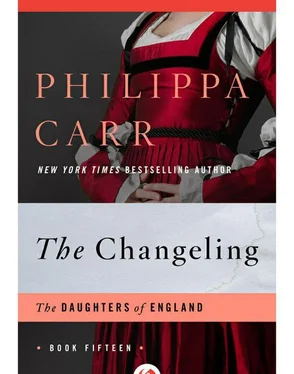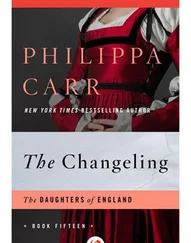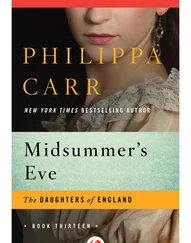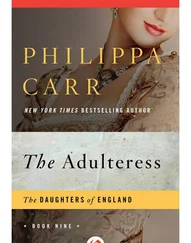Desperately I hoped that something would happen to prevent this marriage, but the days passed and the wedding day was fast approaching.
Benedict Lansdon had been fortunate in finding an old manor house on the market. It needed a good deal of restoration but my mother had said she would love to help in doing that. It had been built sometime in the early 1400s and restored in the days of Henry VIII—at least the two lower stories had; the upper one was pure medieval.
I should have been greatly interested in it if it had not been his house, for it was quite impressive if one did not compare it with Cador. It was shut in by red brick walls and there was an overgrown garden. I did like the garden. It was a place to lose oneself in. My mother was very excited. She was in a mood to find everything connected with her life wonderful. I wanted to remain aloof, but I could not. I was completely fascinated by Manor Grange, which was the name of the house, and I was drawn into discussions on medieval tiles and linen fold paneling, for the roof was faulty and we had to find the right tiles for repair, which was not easy, as they had to be both ancient and in good condition.
There was a long gallery for which my mother was collecting pictures. Aunt Amaryllis gave her some and my grandparents said she could choose what she wanted from Cador. I could have shared her enthusiasm if Benedict had not been part of it.
Above the gallery were the attics—big rooms with sloping ceilings which would be the servants’ quarters. Mr. and Mrs. Emery had been down to see the rooms they would have and had expressed their delight.
“You must move in before the wedding,” my mother had told her, “just to get everything ready for when we return … Perhaps you could go about a week before.”
Mrs. Emery thought that would be excellent.
“It will be necessary to engage more staff,” said my mother. “We’ll have to go into that carefully.”
Mrs. Emery agreed, bristling with pride which the responsibility of being in charge of a larger household brought her.
It was arranged that the furniture my mother wanted to keep should go down a week or so before the wedding. Our house would be put up for sale and the week before the wedding my mother and I would stay with Aunt Amaryllis and Uncle Peter. My grandparents, who would be coming to London for the wedding, would stay there also.
It was with great pleasure that the Emerys installed themselves in the new house, taking Jane and Ann with them. The Emerys immediately set about engaging more staff. They had changed overnight; they bristled with importance. Mrs. Emery affected black bombazine which rustled as she walked; she had also acquired jet beads and earrings which seemed to be the insignia of housekeeping dignity. She had assumed a new aura; she was imperious and formidable. Mr. Emery was only slightly less so. He was most carefully dressed in a morning coat with striped trousers. There was a world of difference in being butler to Mr. Benedict Lansdon, M.P., from handyman at the small residence of Mrs. Mandeville.
My mother laughed immoderately about the attitude of the servants and I laughed with her. So there were times when we seemed as close as we had ever been.
Then there was the house which was to be our London residence. It was tall, elegant and Georgian, situated in a London square opposite enclosed gardens. It was similar to that of Uncle Peter and Aunt Amaryllis, only Benedict Lansdon’s—naturally—was even more grand. There was a spacious hall and a wide staircase, ideal for receiving guests before they were conducted to the lofty drawing room on the first floor where of course a Member of Parliament with high ambitions would do a great deal of entertaining. It was furnished with expensive simplicity—red and white with a touch of gold here and there. I wondered if I should ever feel it was home to me. I believed I would always think longingly of my room in our old house which was about half the size of the one allocated to me here. Miss Brown’s was almost as large. Then we had a schoolroom on the same floor—very different from the little box of a room where Miss Brown and I used to work.
Miss Brown was as delighted by the change as the Emerys but she did not show it so blatantly. I wondered if I should have shared their pleasure in our more opulent way of life if I had not had to accept Benedict Lansdon with it.
It was coming closer. The servants had left for Manorleigh; my mother and I had moved in with Uncle Peter and Aunt Amaryllis and the preparations seemed more intensive than ever. Nobody spoke of anything but the wedding.
My grandparents arrived. I was allowed to join the dinner party. Uncle Peter had said that as soon as the children came of a reasonable age they should do so because it was good for them to listen to the conversation of adults which gave them confidence. I have to admit to being a little fascinated by him. He was always so charming to everyone and made me feel that, young as I was, I was of some importance. There was none of that “not for the children” attitude from him. He would often address me and sometimes when he was talking at the table his eyes would meet mine and it was almost as though there was a secret understanding between us. What made him so attractive was that aura of wickedness about him. I knew there was something, but I was not sure what. It set him apart, some scandal from the past which he had overridden and from which he had emerged triumphantly by snapping his fingers at conventions. Mystery was very attractive. I was constantly trying to find out what he had done but no one would tell me.
It was strange because he reminded me so much of Benedict. I had the feeling that when he was Benedict’s age he must have been rather like his grandson. Scandal had touched them both … and neither of them had allowed it to destroy him. There was something indestructible about him. I hated Benedict. I had admitted it at last. And it was because I was afraid of him. But on the other hand, because I had nothing to fear from Uncle Peter, I was fond of him.
There was no doubt that Uncle Peter was delighted by the coming marriage; he beamed his approval. He was certain that Benedict was going to succeed and politics had always fascinated him. He himself had planned such a career and whatever that scandalous thing was in his past, it had put an end to it. But he lived politics through his son-in-law Martin Hume. I had heard it said: “Martin is Peter’s puppet.” I wondered if this was so. I could well believe it. And now Benedict was to follow that tradition. But of one thing I was certain: Benedict would never be anyone’s puppet.
Uncle Peter was very rich. So was Benedict. I had an inkling that they had both come to be wealthy in a rather shady way.
I wished I knew more. What frustration it is to be young … when people hide things from you and you can only glean little pieces of information. It is like fitting together a jigsaw puzzle with the most important bits missing.
Conversation at the dinner table was all about the wedding and the honeymoon which was to be in Italy. They would not go to France because that was where my mother had had her first honeymoon with my father. She used to tell me about the little hotel in the mountains overlooking the sea, where they had stayed.
“I wouldn’t stay away too long,” said Uncle Peter. “You don’t want the people of Manorleigh to think their new M.P. is deserting them.”
“We shall be away a month,” my mother told him, and, seeing Uncle Peter looked a little shocked, she added: “I insisted.”
“So you see,” said Benedict, “I had to agree.”
“I am sure the electorate of Manorleigh would realize that a honeymoon is a rather special occasion,” put in my grandfather.
Читать дальше












